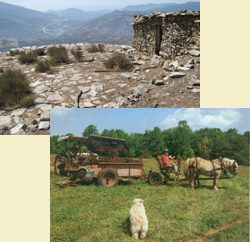Recent Additions
The Achilles Heel of the Climate Change Warriors: The limits of complexity science
Saturday, December 30th, 2023The goals of this essay are two. First, I will expand the critique of the ways we do science that I made in premise #3 of An agroecological model for the end of the oil age. My hope is to raise questions about our deeply ingrained faith in all the current methods of scientific inquiry. [...]
After Collapse, What Next?
Friday, April 15th, 2022When global empires start to fall apart, the structure of interdependent elements accumulated over the years imparts an inertia that appears to sustain them for a while past their normal collapse date. In the case of the US empire, this illusory momentum, combined with a shocking degree of mendacity and deception in the mass media, [...]
What props up the delusion of growth paradigm?
Sunday, September 19th, 2021The general trend in the global economy has been toward lower growth and productivity in the last half century. This trend is easily explained in biophysical economics as due to 1) increasing scarcity of finite resources due to depletion, itself the result of massive consumption in the modern age, and 2) erosion of carrying capacity [...]
What is Sustainable?
Monday, January 8th, 2018Answers to this question that are rooted in the relevant scientific disciplines – primarily systems ecology, the physics and economics of natural resource science and the world-system method of the history of civilizations – are so unsettling to most people in their implications for the future of modern civilization that they are met with denial. [...]
Humans Have Energetically Overpowered the Earth
Monday, September 7th, 2015All life depends on constant consumption of energy. Nothing happens without it. More energy, more stuff happens: goods, services, population, raw materials depletion, pollution, damage to soil, water and other ecosystem processes that are essential to all life, including humanity. Less energy, less of all of the above. For most of several billion years of [...]
Forces Driving the US Political Economy
Monday, May 4th, 2015The Crutches and the Consequences
Since the 1970s US economic growth has slowed, resulting in a declining standard of living for the majority in the lower classes. The decline in material standard in the US would be far worse but was artificially propped up in several ways.
First, we allowed foreign imports to replace our industrial production, [...]
Three Farmhouses: A Study in Passive Solar Design
Wednesday, August 21st, 2013I have just added this account of my experiences in energy-efficient housing design and construction to my Core Papers on this website. It is an attempt to fill a gap in the literature of low energy design that, in view of the long-term energy crisis that the world is entering, I see as a serious [...]
What systems thinking reveals: from biology to political economy
Saturday, February 9th, 2013The way we do science today suffers greatly from the dominance of the reductionist paradigm. A general pattern has emerged where technologies based on purely reductive science work for a while as expected, then start to produce unexpected and often unwanted results, outcomes that at least from a reductionist perspective are a surprise and are [...]
How Many People Can the World Really Hold?
Monday, October 1st, 2012Spreading awareness that the human population is in overshoot of the carrying capacity of the planet has led to a number of attempts to calculate what the true carrying capacity might be. My objective here is not to provide another calculation, but to explore some issues that need to be faced to address the question [...]
The Case for a Disorderly Energy Descent
Friday, May 20th, 2011The energy descent from peak oil production imposes decades of contraction in the global economy. An orderly contraction, particularly in the US, is not likely for a number of reasons. This is a summary of the case for a disorderly descent, garnered from many sources, a couple of which are listed at the end of [...]
« Previous Entries